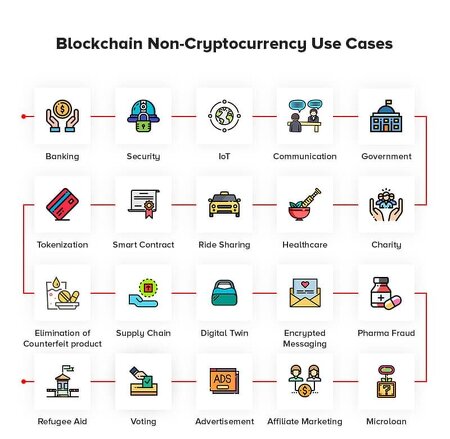
Both Blockchains have remained absolutely secure and are, due to the qualities explained, almost certain to remain so. What many people confuse with Bitcoin or Ethereum being hacked is actually cryptocurrency exchanges or online wallets being hacked.
Use Cases for Bitcoin that Actually Make Sense
What are good use cases for Blockchain?
That’s the good news—if you own Bitcoins. Make no mistake, cryptocurrency trading is risky, security-wise, even as cryptocurrency advocates promote Bitcoin as a safe way to buy and sell goods and services. That’s primarily because the investor usually has total control over transactions, with no central authority.
The process of understanding and accessing the flow of crypto has been an issue for many cryptocurrencies, crypto-exchanges and banks. The reason for this is accusations of blockchain enabled cryptocurrencies enabling illicit dark market trade of drugs, weapons, money laundering etc. A common belief has been that cryptocurrency is private and untraceable, thus leading many actors to use it for illegal purposes. The development, some argue, has led criminals to prioritise use of new cryptos such as Monero.
A blockchain database is managed autonomously using a peer-to-peer network and a distributed timestamping server. They are authenticated by mass collaboration powered by collective self-interests.
Blockchains act as decentralized systems for recording and documenting transactions that take place involving a particular digital currency. Put simply, blockchain is a transaction ledger that maintains identical copies across each member computer within a network. The fact that the ledger is distributed across each part of the network helps to facilitate the security of the blockchain.
Use Case 2: Programmable Money
A blockchain can maintain title rights because, when properly set up to detail the exchange agreement, it provides a record that compels offer and acceptance. If you have a wallet, but it isn’t connected to a bank account, debit, or credit card, you can buy bitcoin using cash through a peer-to-peer exchange.
The bitcoin design has inspired other applications, and blockchains that are readable by the public are widely used by cryptocurrencies. Sources such as Computerworld called the marketing of such blockchains without a proper security model “snake oil”. Cryptocurrencies of all types make use of distributed ledger technology known as blockchain.
What is the use case for bitcoin?
Investment (Many people also buy Bitcoin as an investment) Coinbase is a popular coin exchange people use to invest in Bitcoin. Sending & Receiving transactions (The most popular use case) Bitcoin allows you to send value across the world faster and with lower fees compared to banks and other financial institutions.
The journal covers aspects of mathematics, computer science, engineering, law, economics and philosophy that relate to cryptocurrencies such as bitcoin. The first blockchain was conceptualized by a person (or group of people) known as Satoshi Nakamoto in 2008.
The user clicks the “Buy” tab to buy digital currency and the “Sell” tab to sell digital currency. You select which currency you are buying/selling and which payment method (your bank account or credit card) you want to use.
- The analysis of public blockchains has become increasingly important with the popularity of bitcoin, Ethereum, litecoin and other cryptocurrencies.
- The process of understanding and accessing the flow of crypto has been an issue for many cryptocurrencies, crypto-exchanges and banks.
The question is about public accessibility of blockchain data and the personal privacy of the very same data. It is a key debate in cryptocurrency and ultimately in blockchain.
Such a design facilitates robust workflow where participants’ uncertainty regarding data security is marginal. The use of a blockchain removes the characteristic of infinite reproducibility from a digital asset. It confirms that each unit of value was transferred only once, solving the long-standing problem of double spending.

Bitcoin was launched in 2009 as a decentralized digital currency, meaning that it would not be overseen or regulated by any one administrator, like a government or bank. Peer-to-peer transactions have fueled the rise of the digital currency world, and bitcoin has been at the forefront throughout. The blockchain is a public ledger used to verify and record these transactions. In September 2015, the first peer-reviewed academic journal dedicated to cryptocurrency and blockchain technology research, Ledger, was announced.
If you’re worried about security, however, you can send the bitcoin in your Square Cash Account to another wallet of your choosing. Square limits deposits to $10,000 per week, but there is no limit to what you can sell. The availability of the above payment methods is subject to the area of jurisdiction and exchange chosen. Below is a screenshot of the bitcoin interface on Coinbase showing how to buy and sell bitcoin and also Bitcoin Cash,Ethereum, and Litecoin, which are other popular virtual currencies.
On 8 May 2018 Facebook confirmed that it would open a new blockchain group which would be headed by David Marcus, who previously was in charge of Messenger. Facebook’s planned cryptocurrency platform, Libra, was formally announced on June 18, 2019. This allows the participants to verify and audit transactions independently and relatively inexpensively.
Blockchain is considered hassle free, because of the extra level of security it offers. The Square Cash app is a leader in peer-to-peer money transfers, right alongside PayPal’s Venmo. The Cash app comes from Square, the company that makes those mobile credit card readers. Square is a huge financial technology company that includes many other services—one of which is trading bitcoin. Unlike most online exchanges, the Cash App stores your bitcoin in your Square Cash Account, rather than a separate digital wallet.
In the case of Bitcoin, the sender must present a private key, signifying ownership, and a public key, which represents the ‘address’ of the digital wallet the Bitcoin is held in. Blockchain was invented by a person (or group of people) using the name Satoshi Nakamoto in 2008 to serve as the public transaction ledger of the cryptocurrency bitcoin. The invention of the blockchain for bitcoin made it the first digital currency to solve the double-spending problem without the need of a trusted authority or central server.
Most cryptocurrencies use blockchain technology to record transactions. For example, the bitcoin network and Ethereum network are both based on blockchain.
Use Case 1: Digital Cash
Unlike typical bitcoin wallets, peer-to-peer exchanges work similarly to Craigslist for cryptocurrency. They allow buyers and sellers in the same areas to find each other and meet up to trade bitcoins for cash. With peer-to-peer exchanges, it’s important to remember that you are trading high-value currency with strangers you have never met before. If you choose to exchange bitcoin in this way, we recommend that you meet buyers and sellers in a public place with high visibility. Banks preferably have a notable interest in utilizing Blockchain Technology because it is a great source to avoid fraudulent transactions.
There is the additional complication that it is possible to register a Bitcoin address that has no links to the holder’s real-world identity. However, this is a potential criticism of the cryptocurrency system and not related to the security of the Blockchain technology itself.
Blockchain transaction ledgers are also decentralized, which means copies exist on numerous ‘nodes’. Nodes are computers participating in a particular Blockchain application. In the case of public Blockchains such as cryptocurrencies, the number of nodes can reach millions. For a change to be made to a Blockchain, at least 51% of the participating nodes must verify it. For new transactions, this means that 51% of the network must be satisfied the verification criteria have been met ie.
The analysis of public blockchains has become increasingly important with the popularity of bitcoin, Ethereum, litecoin and other cryptocurrencies. A blockchain, if it is public, provides anyone who wants access to observe and analyse the chain data, given one has the know-how.


